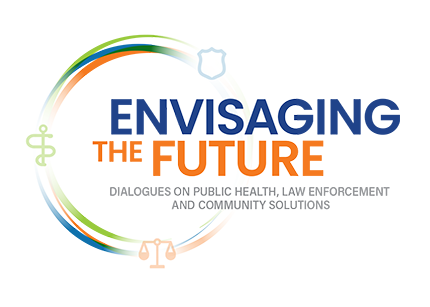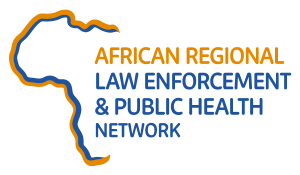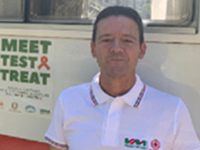Marketplace of Ideas 2022 / Event programme / Thematic session #2

WEDNESDAY 07 SEPTEMBER 2022
Thematic session #2 | Deflection, diversion and referral: Out of harm’s way
7am Los Angeles/10am New York/3pm London/5pm Nairobi/9pm Bangkok/midnight Sydney
There are many models of programmes to keep people out of the criminal justice system and deflected or diverted to more appropriate care and response, within the health and welfare systems. We showcase here examples of such programmes from many different cultural and political settings:
- Police mediated legal and social assistance to people who use drugs: a pilot model (Ha Noi, Vietnam)
- An overview of Police Referral Schemes in Eastern European and Central Asian countries: Interaction between law enforcement agencies and civil society (Belarus, Moldova, Kazakhstan, Ukraine)
- The Emergency Unit of the Villa Maraini Foundation (Italy)
- Law Enforcement Assisted Diversion: Let everyone advance with dignity: Lessons from three continents (United States/UK/South Africa)
Session duration: 105 minutes
The purposes of the GLEPHA Deflection and Diversion Special Interest Group are:
- To provide an international forum for members to engage in discussion and knowledge exchange on deflection and diversion.
- To provide a set of international guidelines for deflection and diversion that national and local contexts can adapt to meet their own needs.
- To explore deflection and diversion at a systems level to critically explore the issue of criminalization of vulnerable populations, exploring how public health outcomes can be improved.
The Special Interest Group is a network of individuals who have knowledge, experience or interest in the field of deflection and diversion. This includes deflection from arrest, police diversion, prosecutorial diversion, and diversion from both criminal and civil court proceedings.
https://glepha.com/special-interest-groups/deflection-and-diversion-sig/sig-dd-purpose-and-aims/
MODERATORS
Brendan Cox
Brendan Cox is the Director of Policing Strategies at the Law Enforcement Assisted Diversion (LEAD) National Support Bureau where he provides strategic guidance on the implementation of Law Enforcement Assisted Diversion internationally. Brendan was previously employed with the Albany, New York police department where he retired as Chief of Police in 2017. Brendan has a Bachelor of Science in Criminal Justice from the University of Dayton and a Master of Public Administration from Marist College. He is a graduate of the Police Executive Research Forum’s Senior Management Institute for Police. He is a member of the New York State Juvenile Justice Advisory Group and was appointed to the New York Governor’s Workgroup to Draft Legislation for Regulated Adult-Use Marijuana Programme. He is a speaker for the Law Enforcement Action Partnership and a member of the Global Law Enforcement and Public Health Association.
Jac Charlier is the Executive Director of TASC’s Center for Health and Justice, and the Executive Director and co-founder of the Police, Treatment, and Community Collaborative (PTACC). Jac is a co-founder and leader of the international deflection movement, and serves in a wide-variety of roles related to the growth and development of the global field of deflection and pre-arrest diversion from research to legislation to policy to practice.
Jac’s core expertise is in crime reduction with a focus on the intersection of drugs and crime. Related to this, he is a Master Global Trainer in Alternatives to Incarceration with the US Department of State, Bureau of International Narcotics and Law Enforcement.
Prior to Center for Health and Justice, Jac served in the State Parole Division and was promoted through the ranks from Officer to District Commander to Deputy Chief, Operations. As Deputy Chief, he created the Division’s first domestic violence units, human trafficking response teams, and the first women’s gender-specific trained officers.
SPEAKERS
Nguyễn Minh Trang
Trang Nguyen joined Supporting Community Development Initiatives (SCDI), a local non-governmental, not-for-profit organization in Vietnam since 2014 as Coordinator of Vietnam Network of People Who Use Drugs and rose to the challenge of a Programme Manager of the Harm reduction and Addiction Treatment Programme in 2019. During her time in SCDI, Trang has worked in all aspects of the drug use issue in Vietnam, including network development and coordination, treatment model operation, cooperation with police and journalists, and advocacy for enabling environment. In her current capacity as the manager of the HR and Addiction Treatment programme at SCDI, Nguyen is currently focusing her efforts on establishing a police diversion system for drug users and cementing evidence-based, community-based, voluntary addiction treatment in Vietnam.
Dr. Zhannat Kosmukhamedova
Zhannat Kosmukhamedova is the Regional Adviser on HIV/Drugs for Eastern Europe and Central Asia, and global focal point for Law Enforcement and HIV for the United Nations Office on Drugs and Crime (UNODC). With more than 20-year engagement with UNODC, Zhannat’s previous experience included working with International Organization for Migration, UNESCO, and the Asian Development Bank. Zhannat holds a PhD in biochemistry and has extensive experience in research and lecturing in the areas related to occupational health and clinical biology.
Philippe Jose Garcia
Philippe graduated from Tolbiac Economics University and ESGCI International Business School in Paris with a Bachelor in International Trade in 1991. In 2008 he approached the world of addiction, first as a volunteer and then as a Programme Manager for the Villa Maraini Foundation, playing an important role in setting up the International Activities Department. Today, Philippe continues to carry out his Programme Manager function combined with the role of Consultant and Trainer for the Partnership on Substance Abuse (International Federation of Red Cross Red Crescent Societies, Italian Red Cross, Villa Maraini Foundation). Philippe has a wide range of experience in the field of addiction treatment, advocacy and policy, from direct work with drug users, to managing European Commission and United Nations international projects and grants. He has been working for more than 14 years both with beneficiaries and international agencies.
Prof. Monique Michal Marks
Prof. Marks is a research professor who heads up a research centre at the Durban University of Technology. She also co-directs the Bellhaven Harm Reduction Centre which provides low-threshold harm reduction services to roughly 200 homeless and how income people daily. While Prof. Marks has worked in the general field of policing and security governance for over twenty years, in recent years she has focused on the interface between public health and public safety, specifically around drug use and harm reduction. She has authored 7 books and over 60 peer reviewed articles.
Michael Wilson
Michael serves as the South Africa country director of Advance Access & Delivery, a global health non-profit organization. Michael is one of the co-founders of the Bellhaven Harm Reduction Centre, South African’s first low-threshold harm reduction centre. Since 2018, Michael has served as an acting consultant to the United Nations Office of Project Services (UNOPS), supporting countries to strengthen national tuberculosis and HIV programs. Michael holds an appointment as Adjunct Assistant Professor in the Department of Health Behaviour at the Gillings School of Global Public Health and has over a decade of experience designing and running health programmes for people who use drugs and homeless individuals in the United States and South Africa.
Najja Morris-Frazier
Najja Morris-Frazier is the LEAD (Law Enforcement Assisted Diversion) Support Bureau Director. In her current role, Najja is responsible for leading the team which provides technical assistance and support to jurisdictions through all phases of the implementation of their LEAD initiatives both nationally and internationally. Prior to joining the LEAD National Support Bureau, Najja served as a Case Manager, then as Direct Services Supervisor, with the LEAD Pilot programme in Seattle WA for over four years. Before beginning her work with LEAD in 2013, Najja dedicated over 20 years working within the urban areas of Seattle with/on behalf of a wide array of marginalized and disenfranchised communities.
Glenn St. Onge
Glenn served over 20 years with the Albuquerque Police Department where he retired from at the rank of Lieutenant. Glenn served 13 years on patrol and then moved to investigations specializing in Crisis Intervention, Sex Crimes, Violent Crimes, Homicides, Officer Involved Shootings, Child Physical and Sexual Abuse, and Child Exploitation. Glenn is a US Navy Veteran serving 16 years active and reserve. Glenn is currently the Law Enforcement Assisted Diversion (LEAD) Programme Manager for Bernalillo County, New Mexico, USA.
Lisa is the Co-executive Director of Policy at the Public Defender Association and a 2019 MacArthur Fellowship recipient. Lisa served as Deputy Director of the King County (WA) Department of Public Defence after previously serving in similar roles at The Defender Association, a non-profit public defender office. Lisa was a founding staff attorney at the Defender Association Racial Disparity Project, which served as a springboard to the nation’s first ever pre-booking diversion initiative, Law Enforcement Assisted Diversion. Lisa has also served as the Seattle’s Community Police Commission co-chair from 2013-2018 and Commissioner until 2019. She graduated from the University of Washington in 1983, obtained a M.A. in Government from Cornell University in 1987, and a J.D. from Yale Law School in 1995.
Zahra Wynne
Zahra is a Policy Manager at Revolving Doors, a national, U-based charity which seeks to break the cycle of crisis and crime. Zahra works to coordinate Revolving Doors’ influencing and communications relating to policing and diversion, sentencing and probation, resettlement, multiple disadvantage, and systems change.

















